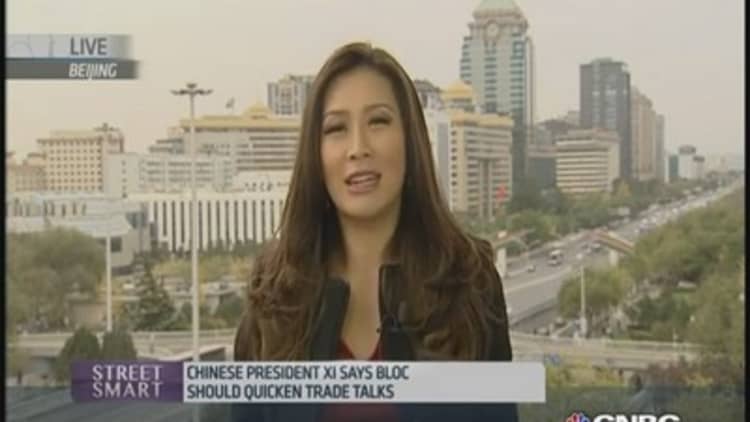
The leaders of China and Japan met for the first time in over two years this week and despite the icy nature of their encounter, experts welcomed the slight thawing in ties.
There were no smiles or banter between Japanese Prime Minister Shinzo Abe and Chinese President Xi Jinping when they shook hands on Monday at the Asia-Pacific Economic Cooperation (APEC) summit in Beijing. Instead, both men were stern-faced and when Abe attempted to speak to Xi, the latter simply turned away to face the cameras.
The tense meeting offers insights into the strained relationship, according to Dr. Zsuzsanna Tungli, founder of Cultural Training Asia, a consulting company specializing in cross-cultural competence.
"The fact that Abe tried to approach the Chinese leader first can be interpreted as a sign that he's willing to repair the relationship, especially seeing as he attempted to say something to Xi," she said. "By not looking at each other, it definitely indicates that something is not quite right between the two. It suggests that they are not quite ready to address the issues at hand. Still, this meeting marked huge progress."
Social media was awash with sarcastic commentary, with some Chinese internet users likening the leaders to Disney characters from Winnie the Pooh.
Chinese Internet users FTW. #APEC2014
The reference is a follow-up to a meeting between Xi Jinping and President Obama in California last year, when micro-bloggers compared to Mr. Obama to cartoon character Tigger.
Deteriorating ties
Relations between China and Japan have sharply soured since Tokyo nationalized certain islands in the East China Sea in 2012, prompting violent anti-Japan protests in China. The disputed territory is called the Diaoyu in China and the Senkaku in Japan.
Abe's visit to the controversial Yasukuni shrine last December also worsened relations. The temple is dedicated to Japan's war dead including numerous convicted war criminals.
Reporting from the APEC summit, CNBC's Susan Li said that in order for in-depth discussions to take place, China's foreign ministry stipulated that Japan must acknowledge the existence of a sovereign dispute over the islands and promise not to make another visit to the shrine.
Read MoreChina slowdown 'not so scary'? Business leaders agree
In a sign of how dire the conflict is between the two nations, a joint survey by Genron and the China Daily in September showed 53 percent of Chinese respondents expected to go to war with Japan.
A tale of two handshakes
Xi met his South Korean counterpart Park Geun-hye with a wide smile on Monday after the two nations announced a landmark free-trade agreement.
Apart from friendly body language, Xi received President Park with the customary national flags in the background, which were missing when he received Abe.
Read MoreWeak Korea exports?Don't blame the yen
South Korea is the only Asian nation with no grudges against China, whose growing assertiveness about its rights in the region has escalated tensions with neighbors in the past year.
Apart from its dispute with Japan in the East China Sea, Beijing also claims the South China Sea nearly in its entirety, rejecting rival claims from Vietnam, the Philippines, Taiwan, Malaysia and Brunei.

